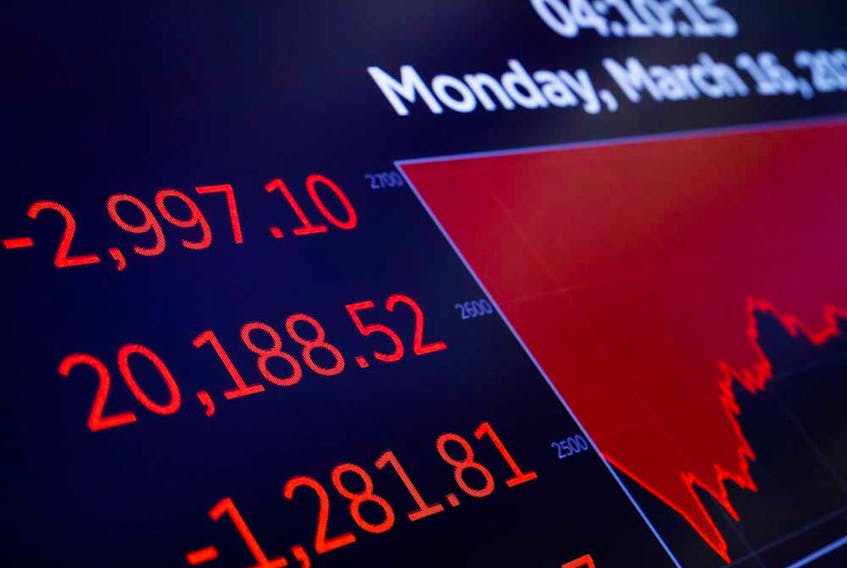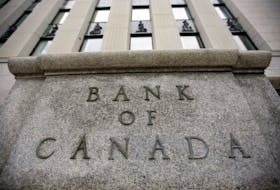The COVID-19 pandemic is having a major impact on business, markets and the economy. For continuous updates, follow along with The Financial Post’s James McLeod @jamespmcleod as he live blogs here. Send tips, announcements and information to [email protected].
5:15 p.m. — That’s a wrap for today: I’ll post any other odds and ends that hit my inbox this evening, but with markets closed, I think that’s all for today. For anybody reading this, if you’re looking for more COVID-19 coverage, Emily Jackson’s Down to Business podcast is always excellent . I haven’t listened to this one yet, but it’s about the economic ramifications of the pandemic, so I’m quite sure it’s worth your time.
I expect I’ll be back at it again tomorrow. Stay safe, and wash your hands.
5:01 p.m. — Canada securities regulator extends filing deadlines: The Canadian Securities Administrators issued a news release Wednesday that they expect a 45-day extension on filings normally required to be made by issuers, investment funds, registrants and other regulated entities.
The details in the CSA release are minimal, but more information is expected soon.
4:35 p.m. — The outlook for oil: This is an important story from Financial Post reporter Gabriel Freidman on the situation with oil markets.
Gabe’s piece is worth reading in full, but the big takeaway is that at current prices, companies in the Alberta oilpatch are losing money on every barrel they produce.
4:25 p.m. — TSX down 7.6%: It was another brutal day for Canadian stocks, with the TSX/S&P composite posting a decline of 7.6 per cent, or 963.46 points.
The Canadian index has been particularly hard hit because in addition to the COVID-19 global pandemic, the crash in oil prices has been a hard blow for the country.
The benchmark Western Canadian crude price dropped below $10 per barrel for the first time ever on Wednesday, and U.S. crude futures dropped by more than 20 per cent, to their lowest levels since February 2002.
4:15 p.m. — Markets finish the day down, again: The Dow Jones Industrial Average officially erased all the gains it made since U.S. President Donald Trump was sworn into office, after another major sell-off Wednesday.
Reuters reports the Dow fell 1,333.61 points, or 6.28 per cent, while the S&P 500 lost 130.93 points, a decline of 5.18 per cent. The Nadaq was down 344.94 points, or 4.7 per cent.
3:44 p.m. — Ikea stores shutting down: Ikea announced that it is shutting its stores across Canada indefinitely.
From the company: “Our communities are working hard to prevent the spread of COVID-19, and to support these efforts, we will temporarily close all stores to customers until further notice to support social distancing efforts and based on recommendations from local health authorities.”
The company said it would “continue to support co-workers through our comprehensive benefits package and paid leave policy.”
3:36 p.m. — Moody’s reviewing Air Canada and Westjet credit ratings: Moody’s Investors Service has placed both Air Canada and Westjet credit ratings under review for a potential downgrade.
The credit rating agency said that the “the passenger airline sector has been one of the sectors most significantly affected b y the shock given its exposure to travel restrictions and sensitivity to consumer demand and sentiment.”
In a pair of releases relating to Air Canada and Westjet, Moody’s also said, “base case assumptions are that the coronavirus pandemic will lead to a period of severe cuts in passenger traffic over at least the next three months with partial or full flight cancellations and aircraft groundings, with all regions affected globally.”
3:08 p.m. — Bank of Canada asks retailers to keep using cash: The Bank of Canada issued a statement asking retailers to continue accepting cash amid the COVID-19 pandemic.
Here’s the full statement from the central bank:
“During this time of heightened public health measures intended to limit the transmission of COVID-19, some consumers and businesses are choosing not to use cash to limit potential exposure. Refusing cash could put an undue burden on people who depend on cash as a means of payment. The Bank strongly advocates that retailers continue to accept cash to ensure Canadians can have access to the goods and services they need.”
2:45 p.m. — Air Canada stock plunges 40%: Just posted, Emily Jackson has a report on the situation with Air Canada , where the stock is dropping dramatically due to the COVID-19 travel shutdowns.
2:35 p.m. — Ontario finance minister endorses federal stimulus: Ontario Finance Minister Rod Phillips said that the $27 billion in direct aid from the federal government, in addition to $55 billion in tax deferral for business, was a “positive” move in response to the COVID-19 pandemic.
Phillips will deliver an economic and fiscal update next week with his own measures to address the economic ramifications.
“What the federal government did today is a very good indication of who unprecedented this is,” Phillips said.
“This will be with us for a while. We will present our perspective from an economic point of view next week.”
2:10 p.m. — Conservatives call government response ‘inconsistent’: Speaking in Ottawa, Conservative MP Dan Albas was critical of the Liberal government’s response to the COVID-19 pandemic.
“This inconsistency does not inspire confidence from the Canadian people,” Albas said.
Albas said it’s important for frontline health care workers to have the support they need, and citizens need money in their pockets. He said the stimulus package announced by the Liberal government earlier today is something that the Official Opposition is still handling.
2:05 p.m. — North American markets plunging: The Dow Jones Industrial Average is currently down 9.06 per cent, the S&P 500 is down 8.35 per cent, and the Nasdaq is down 7.66 per cent.
In Toronto, the TSX/S&P composite is down 8.69 per cent.
1:40 p.m. — Canadians want to hear more from scientists, less from politicians: According to public opinion research, amid the COVID-19 pandemic, 88% of Canadians want to hear more from scientists, and not so much from politicians. Public relations firm Edelman does a regular “Trust Barometer” report, and they issued a special report Wednesday about the pandemic.
Other key takeaways:
- Adults under 34 are split 50-50 on whether they’re getting most of their news from news organizations or from social media. Older Canadians are mostly getting their information from news orgs.
- 56 per cent of Canadians say they’re following the COVID-19 story daily.
1:14 p.m. Trading halted as market plunges: Financial Post colleague Victor Ferreira reports that the Dow Jones Industrial Average has now wiped out all of the gains made since U.S. President Donald Trump took office. Trading was halted on the S&P 500 after the index dropped by seven mer cent.
12:32 p.m. — Gig economy workers: I missed this earlier, but my Financial Post colleague, Vanmala Subramaniam posted on Twitter about gig economy workers , who will get $900 every two weeks from the federal government to help get through the COVID-19 pandemic. These benefits will last for 15 weeks.
12:24 a.m. — Poloz says Canada is in a better position than 2008: Bank of Canada governor Stephen Poloz said that Canada has the ability to be nimble in response to the COVID-19 economic turmoil, and the Canadian banking system is stronger than it was in the 2008 financial crisis.
“We actually do have the best banking system in the world and it is, indeed, vastly strengthened compared to 12 years ago because of new global standards,” Poloz told journalists in Ottawa.
However, he said nobody knows what’s coming with the pandemic: “We honestly don’t know what’s coming our way.”
12:09 p.m. — Poloz not ruling out emergency rate cut or quantitative easing: Bank of Canada governor Stephen Poloz said he’s not necessarily holding off an interest rate cut until April 15, but he said that the Bank needs to do a lot of assessment of what’s happening in the economy.
“I was being fairly careful to not rule out actions at any time,” Poloz said, adding, “I’m not going to itemize what could cause us to move earlier or not move earlier at this stage.”
Poloz said that a lot of the Bank of Canada moves have happened in the past week to maintain liquidity in the market, and he wants to assess the situation before taking more dramatic actions. He added: “it seems to be functioning well so far”
Asked specifically about the possibility of quantitative easing, Poloz said: “I would certainly not rule out quantitative easing. Of course now. That is something that is a standard part of the central bank toolkit.”
12:05 p.m. — Morneau says he’s ready to work with Alberta and N.L. on oil: Finance Minister Bill Morneau didn’t offer any details, but he said he’s ready to work individually with Alberta and Newfoundland and Labrador to address the economic issues arising from the crash in oil prices.
11:56 a.m. — Poloz says no change in rates “for now”: Bank of Canada governor Stephen Poloz says that he was waiting for details of the fiscal stimulus announced today by the federal government, and they will be updating economic forecasts based on the new information. Poloz said April 15 is the next scheduled announcement date for a change to rates, and “for now” that’s all he’ll say.
11:42 a.m. — Details of federal COVID-19 economic response: Ok, so I think this is the complete list of measures that the Department of Finance is announcing today. Finance Minister Bill Morneau is still speaking, and he’s emphasizing that this is only the first phase of the response.
I’ll be updating continuously, especially in the Q&A portion of the news conference with Morneau and Bank of Canada governor Stephen Poloz. I will also link to a write-up that summarizes that list as soon as possible. Keep refreshing this page for more details.
11:37 a.m. — Lots of different mechanisms to get money to workers: To be blunt, Finance Minister Bill Morneau is announcing so many different programs and services for workers, it’s difficult for a liveblogger to keep up. I’ll post the full list as soon as I can find it online.
The bottom line is that the federal government has a lot of different mechanisms to get money to workers who have lost income due to the COVID-19 pandemic. Morneau indicated that the Canada Child Benefit will be boosted, there will be GST rebates, and a suite of Employment Insurance measures.
Morneau said that listening to medical advice and social distancing is vitally important.
11:33 a.m. — Morneau says “fiscal firepower” is coming: Finance Minister Bill Morneau said that fiscal discipline is out the window, and his sole focus is to help Canadians through the COVID-19 pandemic.
Morneau emphasized that the $27 billion direct aid, plus $55 billion in deferred taxation for businesses, is just the “first phase” of the government response.
“My only job is to make sure that Canadians can keep food in the fridge, that they can keep a roof over their heads, to make sure they can afford medicine,” Morneau said.
11:22 a.m — Consumer confidence is way down: In another grim sign of the times, the Conference Board of Canada is reporting the largest ever monthly drop in consumer confidence.
“There were no positives in this month’s survey – every region saw a double-digit decline in confidence and every question saw a significant weakening in responses,” the Conference Board said.
11:19 a.m. — Trudeau stimulus underwhelming: Quick reaction from Financial Post columnist Kevin Carmichael is that the stimulus announced by Prime Minister Justin Trudeau is underwhelming. Kevin points out that Sweden is doing six per cent of GDP, as stimulus, compared to three per cent so far in Canada.
11:12 a.m. — Morneau speaking momentarily: Prime Minster Justin Trudeau has finished his media availability from outside his residence where he’s in self-quarantine. Finance Minister Bill Morneau is expected to speak to Canadians momentarily, with more detail about economic supports for business and workers amid the COVID-19 pandemic crisis.
11:05 a.m. — More detail on Trudeau economic measures: Here’s a quick write-up of what Prime Minister Justin Trudeau announced this morning.
10:55 a.m. — Full measures announced by PMO: National Post reporter Brian Platt has posted the full list of measures announced today by Trudeau to provide funding to the businesses and groups hardest hit by COVID-19. And here are the business-specific measures , from Brian.
10:53 a.m. — Trudeau announces various targeted funding: Prime Minister Justin Trudeau announced a suite of different direct funding efforts for Indigenous communities, for homeless, for victims of domestic abuse, for farmers and others.
Trudeau said more measures will be coming to support sectors of the economy particularly hard hit by COVID-19. In speaking to media in Ottawa, he emphasized that the government is prepared to do more as the crisis unfolds.
10:48 a.m. — Wage subsidy for small business: Prime Minister Justin Trudeau said that small business owners will be able to access a wage subsidy equivalent to 10 per cent of their total wage bill, in an effort to encourage employers to not lay off workers amid the COVID-19 crisis.
10:45 a.m. — Trudeau announces $82 billion in stimulus: Prime Minister Justin Trudeau announced $27 billion in direct support for people affected by COVID-19, plus another $55 billion in liquidity for business, through tax deferrals. Trudeau says this amounts to more than three per cent of Canada’s GDP.
10:41 a.m. — Canadian crude drops below $10/barrel: The fallout of the COVID-19 turmoil and the global oil price war is pushing down crude prices, Bloomberg reports .
10:22 a.m. — Porter Airlines suspending service: On Twitter, the airline announced that it’s suspending service on Friday, and will keep operations shut down until at least June 1.
10:20 a.m. — Rogers shuts most stores: Rogers Communications Inc. said it’s closing “most” of its retail stores until March 31. The news release does not say how many stores will be closing, but the company will be keeping 93 locations open.
10:15 a.m. — Trudeau to speak at 10:30 a.m.: As a programming note, Prime Minister Justin Trudeau is expected to speak at 10:30 a.m. with Finance Minister Bill Morneau and Bank of Canada governor Stephen Poloz speaking to media after that.
We were already expecting major news out of these media availabilities, with the government signalling that it would be announcing major economic stimulus. Meanwhile, U.S. president Donald Trump announced in a tweet that the border is closing to non-essential traffic.
So … lots happening. Stay tuned.
10:05 a.m. — Air Transat suspends flights: Transportation reporter Emily Jackson is reporting that Air Transat is suspending flights and laying off workers. The airline says the shutdown will last until April 30, in response to COVID-19. Read Emily’s story for a lot more detail on the situation.
9:50 a.m. — Markets drop at opening bell: The Toronto Stock exchange fell sharply in the opening minutes of trading, erasing yesterday’s gains. The TSX/S&P composite index was down 516.86 points, or 4.07 per cent.
Other major North American indexes dropped as well, with the Dow Jones Industrial Average falling more than a thousand points, or 4.94 per cent at opening. The S&P 500 was down 3.66 per cent and the Nasdaq Composite dropped 5.90 per cent.
9:47 a.m. — No rate cut from Bank of Canada today: Bank of Canada Governor Stephen Poloz will not be announcing an interest rate cut this morning, according to a statement from the Bank of Canada.
Reuters reports that the statement says Poloz “will not be announcing any new measures or actions” today.
9:35 a.m. — Trump announces border closure: In a tweet , U.S. President Donald Trump just announced that the Canada-U.S. border is closing “by mutual consent” for all non-essential traffic.
9:24 a.m. — CAD hits four-year low: Reuters is reporting that the Canadian dollar has hit a four-year low, trading at 69.47 U.S. cents Wednesday morning. The Loonie has been plunging due to a combination of the COVID-19 crisis, and the ongoing weakness in oil prices.
8:52 a.m. — Morneau, Poloz to hold joint announcement: A media advisory says that Finance Minister Bill Morneau and Bank of Canada governor Stephen Poloz will hold a joint news conference at 11:15 a.m. today.
Prime Minister Justin Trudeau is also expected to speak to the media this morning at 10:30 a.m. It’s worth noting that Trudeau’s news conferences have often been delayed past their scheduled start time, and if he’s running late that will probably push back the Poloz and Morneau announcement.
I’ll be following both announcements and posting economic details here, so keep an eye on this page.
8:38 a.m. — COVID-19 trade implications: You’re probably not thinking about broccoli farming right now, but Financial Post reporter Naomi Powell has a great look at how COVID-19 travel restrictions could impact the food supply . Fruit and vegetable growers rely heavily on temporary foreign labour, and shutting the borders could cause significant disruptions.
8:30 a.m. — Posthaste updates: Even when there isn’t a global pandemic, Financial Post editor Yadullah Hussain does a daily “Posthaste” update , with a roundup of links and news stories to follow. With the world in turmoil, this is a good snapshot of what’s happening right now, and what to keep your eyes on as the day unfolds.
8:20 a.m. — Markets opening could be rough: It’s looking like investors are in for another rough morning, as futures markets are anticipating a sell-off when major North American exchanges open. Oil hit a 17-year low.
We’ll be keeping a close eye, but check out this report for what to expect in the coming hours.
8:15 a.m. — Stimulus, border shutdown anticipated: Today is looking like a big day for government response to COVID-19. Multiple media outlets are reporting that Ottawa is set to announce a stimulus package. The CBC is saying it’ll be $25 billion, and the Globe and Mail is saying it’ll be closer to $30 billion.
This report suggests that the economic aid package will be 1% of GDP. The details of how the money will get out to Canadians — whether it’s through GST rebates, employment insurance, or other measures — will be important to watch.
Meanwhile, Canada and the United States are working on a deal to close the border to non-essential travel.
According to this report , a joint statement on the border closure is expected sometime in the next 24 to 48 hours.
7:55 a.m. — Big six banks offering mortgage leniency: Canada’s biggest banks announced new measures to respond to the COVID-19 pandemic turmoil, potentially giving up to six months of payment deferral for mortgages, and other forms of financial relief.
BMO, CIBC, TD, RBC, Scotiabank and National Bank said that they’re ready to work with customers “on a case-by-case basis to provide flexible solutions” in response to childcare costs, gaps in pay, or illness from COVID-19.
In the news release issued Tuesday evening , the banks encouraged people to contact them directly to discuss options. In the statement, the banks said this is a “first step” and more action may be required.
March 18, 2020
Good morning! As the world continues to grapple with the COVID-19 pandemic, Wednesday is looking like another extremely busy day, with the federal government expected to announce a massive stimulus package, and markets showing signs of even more turmoil. Keep refreshing this page to stay up to date on the latest COVID-19 business news as it happens.
• Email: [email protected] | Twitter: jamespmcleod
Copyright Postmedia Network Inc., 2020









